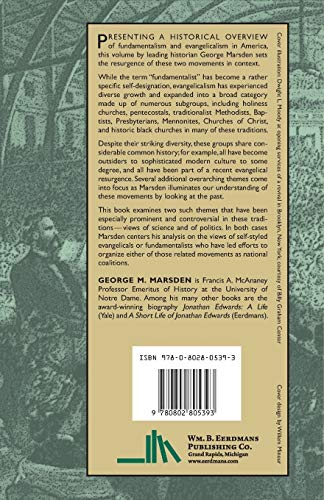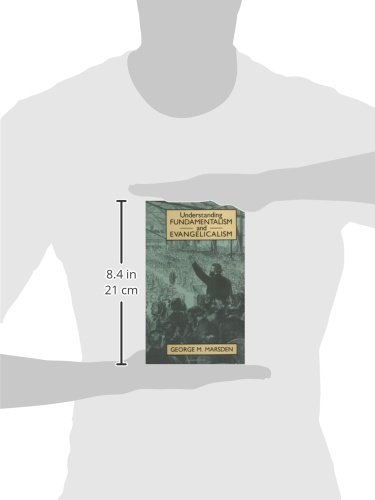Customer Services
Copyright © 2025 Desertcart Holdings Limited




Understanding Fundamentalism and Evangelicalism
D**N
good collection of essays
This book is a collection of essays, written after Marsden's major work Fundamentalism and American Culture . It "elaborates on themes in the Fundamentalism volume, particularly as they shed light on recent developments." (vii) As such, this is not a seamless 'book,' though the essays are arranged in an order that makes sense.For Marsden Fundamentalism and Evangelicalism are on a continuum with considerable overlap, whereas certain Fundamentalists would like that line drawn hard and fast. He starts off with a historical overview, covering E/F's roots and the conflict with "modernism" (1870-1930). He then explores how the the movement diverged into a more discernable E and F, though noting where they did converge.He discusses politics and science, and ends with a chapter on J. Gresham Machen.I enjoyed the book, and found it helpful in understanding the history of my own "stream" (a nice E/F mixture). I was a little surprised and disappointed with Marsden's treatment of the Young Earth Creationism issue. Usually Marsden is the epitome of cool disinterest - the neutral scholar without a dog in the fight. Though it was subtle, he seemed anxious to paint Creationists in a negative light, sometimes as "undeducated" other times as "looking for a fight." This was subtle, and I did find the 3 chapters on "science" to helpful and enlightening overall. Things are not as cut-and-dried as they may initially appear!This is a good book, but of course, if you want the full treatment, you'll need to read his main book on Fundamentalism, as well as the other books Reforming Fundamentalism , and The Soul of the American University .
M**5
Insightful
Marsden covers important ground in this little book. It was a good read for its fairness and realism. He acknowledges the opposite poles and the common ground. It’s helpful history to know in a world that questions the reality of everything through sensationalized content. Read for the pleasure of realism, a fading art.
K**I
George was a member of the faculty while my wife ...
George was a member of the faculty while my wife and I were at Calvin College and I have always found his work intellectually stimulating. I have been inspired by this work to deepen my study of Pre-Protestant Reformation reform movements and their leaders. This book reminded me that often we don't look for the connections between various ideas and movements when we look at the multitude of Christian and other sects. Well researched and written.
F**
Solid, Objective Historical Observations
A solid history explaining the development of fundamentalism in America and the ensuing birth of evangelicalism. Dr. Marsden knows his church history. Really, I would put it at 4.5 stars if I could.
C**I
worth the trouble
This isn't an easy book for those not already steeped in the intricacies of fundamentalist Christianity, but it is worth the effort.
A**R
I would have cheated in seminary
(Hand over mouth yawning prodigously) If I had been assigned this book when I was in seminary I probably would have read the first and last paragraph of each chapter. Or maybe I would have written an essay based merely on the chapter headings. You might imagine from this review that I did not finish it. You would be right, for it commits the worst sin of anything theological, namely, it is BORING.
M**N
A clear and concise history of what fundamentalism is, ...
A clear and concise history of what fundamentalism is, its history and its relationship to evangelism that's sure to entertain and educate the history buff.
R**N
Great read in American Protestantism
Great and critical read about American Protestantism. Marsden is knowledgeable in his subject. Great companion read to "Fundamentalism and American Culture (New Edition) ", also by Marsden.
S**H
One Part Christianity, Two Parts American Spirit
Fundamentalism in today's parlance connotes backward, medieval religious belief. Hence, the question I had when I bought this book was, why does such 'backward' religion thrive in the most technologically-advanced country on the planet (The USA)? George Marsden brilliantly upturned my glib conceptions of Christian fundamentalism.First of all, Marsden notes that Evangelicalism and Fundamentalism are anything but backward. By tracing the development of Evangelicalism from the Second Awakening in the mid-nineteeth century to the 1920's, Marsden shows that Fundamentalism was birthed by a number of factors viz:RAPID URBSANISATION IN THE US. American Protestanism had matured in an era of villages and towns. As more people moved from the countryside to the rapidly growing cities (esp in the North), the familial and community bonds gradually disappeared. Furthermore, the influx of new non-Protestant immigrants from Europe added to the ethnic mix and contibuted to the sense of dislocation.THE RISE OF SECULARISM. As the US rapidly urbanised, secular ideas such as Darwinian evolution seriously challenged the notion of creation and man's special place in the Cosmos. Fundamentalism was then a reaction to these powerful trendsMarsden argues that Evangelicalism became opposed to Liberalism (an attempt of the Church to come to terms with modern sceince). After its nadir in the Scopes trial, many experts thought that Fundamentalism had ceased being a powerful force in US politics. It was not until the 1970's that Fundamentalism re-emerged to challenge "East Coast" liberalism. Marsden identifies a number of factors for the resurgence of faith in US politics: the increasing wealth of the South; the Churches' embrace of modern technology and the sense of liberal over-reach in the 1960's.If you think US religious politics you may think of Jerry Falwell (and the moral majority), Oral Roberts or Jimmy Swaggart. While these televangelists are the most visible manifestations of the movement, evangelicalism goes much deeper; it is a mixture of a American folk religion, individualism, patriotism, self-image, Puritan sense of destiny and capitalism's obsession with growth and fiduciary gain. Much more than a throwback to benighted religion, US evangelicalim is an expression par excellence of the American Spirit. Marsden's Understanding Fundamentalism illuminates this aspect of the American self with clarity. It deserves 4 stars.
M**N
A New Evangelical Understanding
In this title, Marsden assembles and re-packages a collection of essays he wrote in the 1980's. They are incisive and informative, particularly in the areas of giving detailed descriptions of fundamentalism as a Protestant reactionary movement, entwined in culture and US politics. While giving good summaries as well as indepth analyses of the whole evangelical and fundamentalist movements in the US, his major weakness is the New Evangelical lens through which he evaluates the Creation Science movement and the interprtation of Scripture.Marsden advocates a mediating position in relation Darwinian evolution and an acceptance of theistic evolution, which I see as undermining the gospel, the entrance of sin and death and the New Testament teaching on the Person and finished work of Christ.In all, informative, well-written, but with a clear "neo-evangelical" position to advance semi-liberal views similar to David Bebbington and Alister McGrath. My title, "Lost Relation - finding humanity and God" offers a clearer biblical case for a Christianity grounded in supernaturalism in which Christ is pre-eminent.
R**R
Dreadfully boring
Being somewhat familiar with Marsden's writing I looked forward with great anticipation to reading this book. Evangelicalism and Fundamentalism are subjects with which I have significant familiarity and very great interest. The book was a disappointment and for me was simply a dreary recitation of facts with nothing to give it life.
Trustpilot
1 week ago
4 days ago